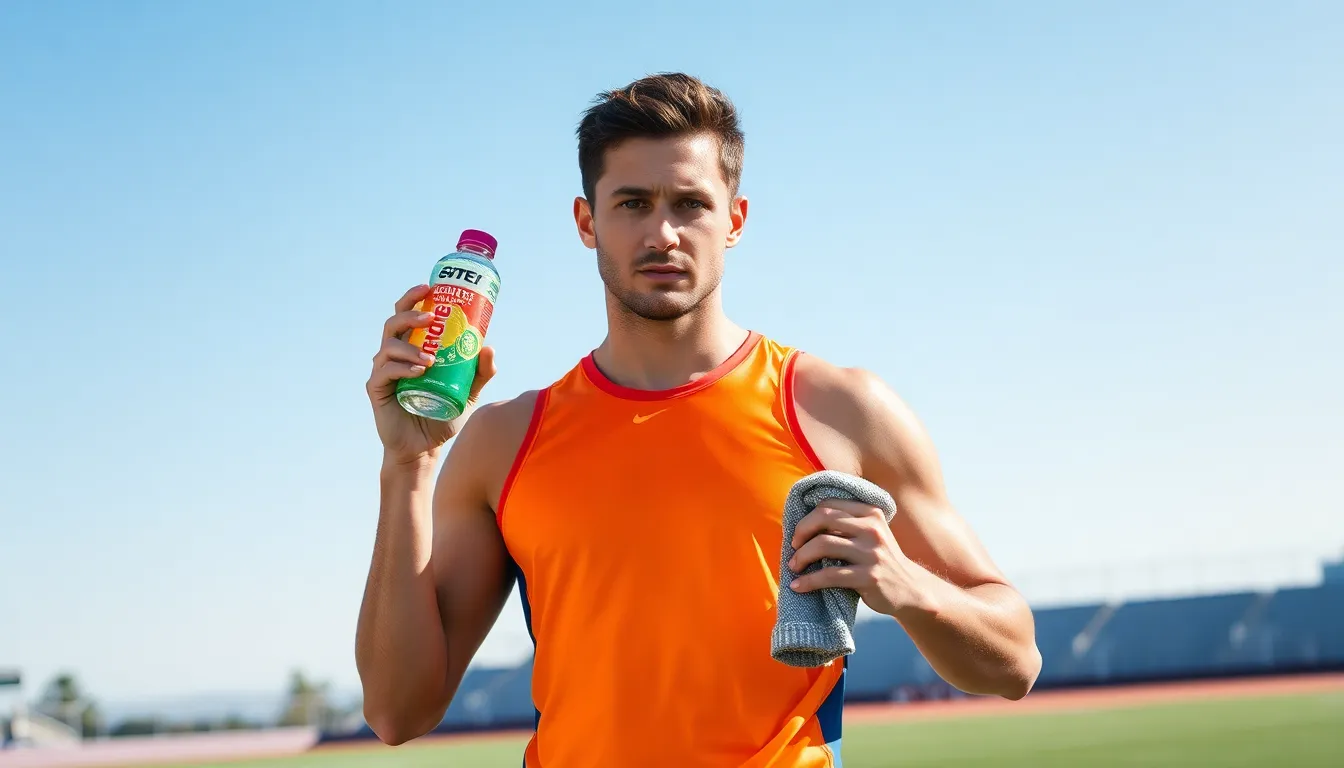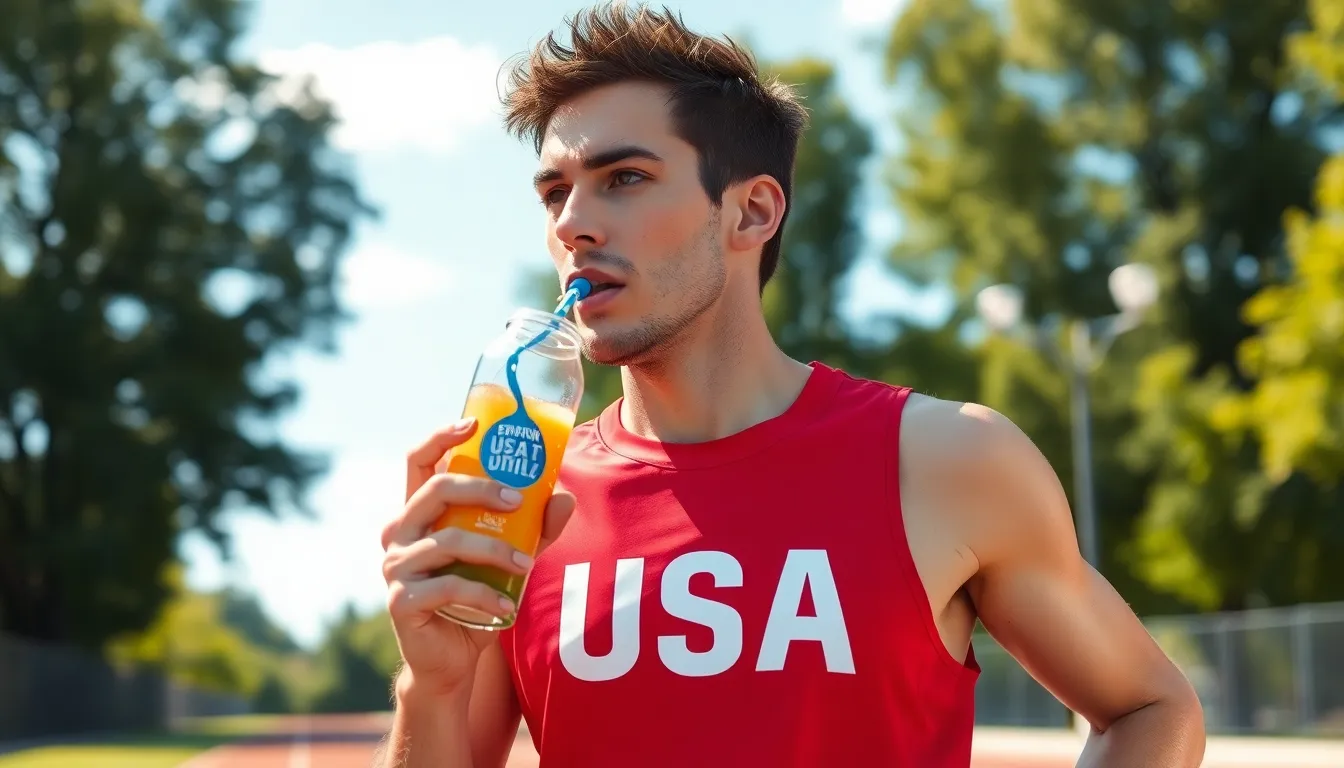Phone:
(701)814-6992
Physical address:
6296 Donnelly Plaza
Ratkeville, Bahamas.

In the world of sports, hydration isn’t just a sidekick; it’s the superhero that saves the day. Fluid sports nutrition plays a crucial role in keeping athletes at the top of their game. Imagine trying to run a marathon with a water bottle that’s empty—talk about a recipe for disaster! Proper fluid intake fuels performance, enhances recovery, and keeps those muscles happy.
But let’s face it, chugging plain water can be as exciting as watching paint dry. That’s where fluid sports nutrition steps in with a splash of creativity. From electrolyte-packed drinks to delicious smoothies, it’s all about finding the right balance to keep athletes energized and ready to conquer the field. So, whether you’re a weekend warrior or a seasoned pro, understanding the ins and outs of fluid sports nutrition can make all the difference between a glorious victory and a not-so-glorious faceplant.
Hydration plays a crucial role in sports performance and recovery. Athletes must ensure adequate fluid intake to maintain optimal performance levels.
Hydration directly affects energy levels, concentration, and muscle function. Insufficient fluid intake leads to fatigue and impaired physical performance. Athletes lose fluids during activities, making it essential to replenish them. Moreover, proper hydration aids in reducing the risk of cramps and heat-related illnesses. Consuming fluids before, during, and after exercise enhances recovery and promotes muscle health. It’s vital for athletes at all levels to prioritize hydration to achieve their goals.
Electrolytes play a significant role in maintaining hydration balance. Sodium regulates fluid retention, while potassium helps with muscle function and prevents cramps. Chloride supports hydration and maintains blood pressure levels. Magnesium contributes to muscle recovery and overall performance. Calcium strengthens bones and assists with muscle contractions. Athletes should incorporate electrolyte-rich beverages and foods to support their fluid sports nutrition plan effectively. Understanding these electrolytes aids athletes in improving performance and recovery during training and events.

Understanding the fluid options available for sports nutrition is crucial for optimizing athletic performance. Various types of fluids serve distinct purposes, addressing hydration needs effectively.
Water hydrates the body efficiently and is often the first choice for hydration. However, during prolonged exercise, water alone may not suffice. Sports drinks provide carbohydrates and electrolytes, addressing energy depletion and fluid loss. Athletes benefit from choosing sports drinks during extended activities or intense workouts when rapid replenishment is critical. Many athletes find that the taste of sports drinks encourages them to drink more, ensuring proper hydration.
Electrolyte solutions play a vital role in maintaining optimal hydration. These beverages contain essential minerals like sodium, potassium, and magnesium, which support fluid balance in the body. Athletes lose electrolytes through sweat, making replenishment essential during and after intense workouts. Consuming electrolyte solutions not only rehydrates but also helps prevent cramps and fatigue. Replenishing electrolytes allows for improved performance and faster recovery, making these solutions a critical component of sports nutrition.
Optimizing fluid intake timing and quantity enhances athletic performance. Proper hydration strategies differ based on exercise phases.
Hydrating before exercise prepares the body for physical activity. Consuming 16 to 20 ounces of fluid at least two hours before exercise is ideal. This ensures adequate hydration levels. An additional 8 to 10 ounces about 20 to 30 minutes prior provides extra support. Athletes should prioritize electrolyte-rich beverages, especially if sweating is expected, to maintain sodium balance.
During exercise, maintaining fluid balance becomes critical. Consuming 7 to 10 ounces of fluid every 10 to 20 minutes is recommended for optimal hydration. Sports drinks with carbohydrates and electrolytes offer benefits, particularly during sessions lasting over an hour. Athletes engaged in intense activities should monitor their sweat loss to adjust fluid intake accordingly. Individual hydration needs vary, making it essential to listen to thirst signals and adapt as necessary.
Post-exercise hydration aids in recovery and muscle function. Replenishing lost fluids within 30 minutes of activity helps kickstart recovery. Consuming 16 to 24 ounces for every pound lost during exercise is crucial. Including electrolyte-rich recovery drinks or foods facilitates rehydration and restores sodium levels. Incorporating water alongside these options ensures comprehensive fluid replenishment, supporting overall recovery and performance.
Understanding the nuances of fluid sports nutrition is crucial for athletes. Two key areas warrant attention: endurance versus team sports and climate and environmental factors.
Endurance athletes require a different fluid strategy compared to team sport participants. Continuous activities, such as running or cycling, often demand sustained hydration efforts, with a focus on electrolyte-rich beverages. He or she typically needs 7 to 10 ounces of fluid every 10 to 20 minutes during prolonged exercise. Team sports, characterized by intermittent bursts of activity, allow for more flexibility in fluid intake. Players can take advantage of stoppages to hydrate but must monitor their fluid loss closely. Each athlete should recognize their unique needs to optimize performance based on their specific sport.
Climate plays a significant role in hydration strategies. Hot and humid environments increase fluid loss through sweat, necessitating higher fluid intake. Athletes in such conditions should consume fluids regularly, aiming for 16 to 24 ounces for every pound lost. Conversely, cooler climates may not stimulate thirst as effectively, urging athletes to hydrate proactively. Dry air can enhance fluid loss from respiration, leading to the need for increased intake. Regardless of the environment, attention to hydration ensures athletes stay at peak performance levels.
Fluid sports nutrition is crucial for athletes aiming to enhance their performance and recovery. By understanding the importance of hydration and incorporating electrolyte-rich beverages, athletes can optimize their energy levels and muscle function. Tailoring fluid intake strategies based on the type of sport and environmental conditions ensures athletes stay hydrated and healthy.
By prioritizing hydration and making informed choices about fluid consumption, athletes can prevent fatigue and improve their overall performance. Embracing fluid sports nutrition not only supports physical health but also contributes to achieving athletic goals.